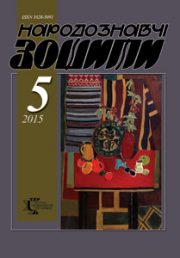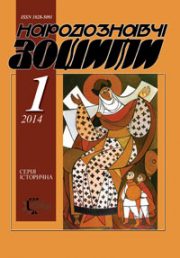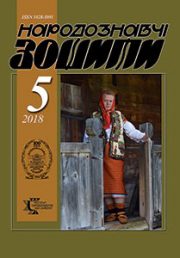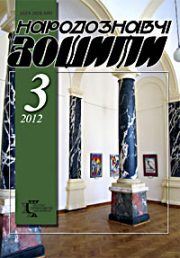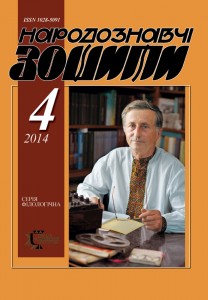
Stepan Pavluk. A scientist’s majestic mission. P. 639-641
Сreative portrait of Ukrainian scientist Vasyl Sokil has been presented in the article. The text has thrown light upon conditions that determined formation of researcher’s philosophic views and scientific positions. The scholar’s great achievements in folklore studies, in academic tutoring as well as in heading the department in the Ethnology Institute of NAS — one of most powerful specialized institutions nowadays have been exposed.
Keywords: academic, folklorist, book, monograph, supervisor.
read »
Galyna Кoval, Hanna Sokil. «And autumn has come into my garden…» (from the folklore heritage of Vasyl Sokil). P. 642-668
The article of homage has been focused on personality of Vasyl Sokil, widely-known Ukrainian folklorist. It has described the scholar’s life and career. The attention has been paid to collecting and research-works in folklore as well as in editorial activities of the scientist. Organizational and scientific efforts, supervisory and opposing positions during defense of theses and plans of future research have been surveyed.
Keywords: life, folklore activities, book, monograph, supervisor, opponent.
read »
Vasyl Sokil. The Revakovych Cleric family in Volosyanka. P. 669-686
The article has dealt with cleric Revakovych family that carried out pastoral activities in Volosyanka over a hundred years (1850—1950). The name of Rev. Ivan Revakovych is also associated with foundation of «Prosvita» school in the village. He was in contact with famous people — F. Zarevych, M. Ustyyanovych, A. Konys’kyi and others. Rev. Michael performed his national-patriotic and Christian mission through economic activities. They both left to their successors well-equipped temple and patriotically-minded congregation — one of the most notable ones in Skole district.
Keywords: parish, family, school, «Prosvita», sсhematism, parish registers, consistory.
read »
Mykhailo Khai. Skilska Volosyanka as a capital of boiko traditional music. P. 687-697
In the article attention has been paid to musical and instrumental traditions of Skilsky Volosyanka region being a kind of musical and stylistic reserve. Contribution by H. Demyan into the study of popular instrumental music of Skole District has been presented and evaluated. Comparative characteristics of structural and typological peculiarities in instrumental melodies of Volosyanka village traditions with similar genre-instrumental features of other styles spread in the mentioned region have been presented.
Keywords: Volosyanka, H. Demyan, ethnical stylistic reserve, variations of strophic order, rhythmicity.
read »
Mykola Dmytrenko. On folklore as a category of genre. P. 698-703
In the article has been considered an actual methodological problem as for understanding the nature and specificity of folklore as genre category. Definitions of term folklore genre have been presented with scholars’ commentaries on different approaches to the genre studies in genre of Ukrainian and foreign folklore. It has been underlined the need for studies in the folklore genre with consideration of its contents, form, function, environment of existence, etc.
Keywords: folklore, genre, specifics of folklore, poetics, сlassification, motif, function, system.
read »
Lesya Mushketyk. On gathering and study of Ukrainian folklore about Hungarian King Matthias. P. 704-712
Historical narrations about King Matthias Corvinus, famous Hungarian ruler of the Late Middle Ages, in the Western Ukrainian folklore has been represented by legends, tales and oral traditions. At various times, these creations were quite actively collected, published and studied by folklorists and historians, so native ones as foreigners. Nowadays, the scientists’ findings are mostly generalized as well as containing a lot of international comparisons especially as for research-works in themes and plot structures.
Keywords: folklore, King Matthias, Hungarian, Ukrainian, collections, researches, genres, works.
read »
Hanna Sokil. Dzhurylo’s image in Ukrainian folklore. P. 713-720
The paper has presented some results of analytical study in folklore image of Dzhurylo (Churylo) with especial attention to origins, semantics and functions of the hero. In certain texts of various genres — ritual songs, tales and ballads one might trace parallels with other characters of oral literature (Jarylo, Kostrub, Shumylo). Narrative remnants in Ukrainian ballads have been put under scientific consideration.
Keysword: ritual songs, motives of benevolence, source, variant, folklore image, spiritualization, character.
read »
Oleh Smolyak. Ladkanka types of wedding songs in Southern Volhynia (after materials from the village of Lypa, Dubno district, Rivne region). P. 721-725
The article has presented musical and stylistic characteristics of ladkanka songs from the village of Lypa, Dubno district in Rivne region (ethnographical area of Southern Volhynia). Attention has been paid to the typology of rhythmic and melodic comparisons and the means of their recultivation under the present-day conditions.
Keywords: wedding ladkankas in Southern Volhynia, rhythmic form of poetry and melody, the way of presentation.
read »
Oksana Brynyak. On functional differentiation of motives in the fabric of poetic artistry after ukrainians’ baptismal songs. P. 726-732
General functions of baptismal songs have been defined in the article. The set of artistic and poetic means used for realization of functional tasks have been exposed. In the study has also been presented structural typological analysis in the key motives of the genre. The research has also brought conclusions as for functional peculiarity of baptismal songs in ritual (practical), ethical, aesthetic and entertaining areas.
Keywords: baptismal song, function, motive, cheering, humorous, feast.
read »
Halyna Koval. Colour as a sign of image formation in the calendar- ritual poetry. P. 733-740
The paper has deals with a category of epithets as means for development the imaging of the folklore texts. In account have been taken artistic definitions qualified with colouring only. Dominating set of colours in glorifying songs that aimed to build perfect folklore images has been presented. Conclusion has been made as for the most wide-spread epithets that belonged to ones with light coloring characteristics (as gold, silver, white, green, red), changed colouring of the present everyday reality into poetic perfection.
Keywords: epithet, artistic definition, colour, folklore image, glorification, calendar songs.
read »
Mariya Kachmar. On metamorphosis in Ukrainian people’s ballads: the aspects of its genetics and functionalism. P. 741-747
In the article have been considered some principles in transformation of Ukrainian folk ballads. Attention has been paid to the origins of metamorphoses in ballad texts, original variants of narratives and contextual relations with mythological world-outlook. Functional load of changes in lyrical epic writings have usually been fully subordinated to the artistic purposes — to concenter on the tragic conflict and to increase emotional stress as well as semantic expressiveness of the composition — has been revealed. Basic types of metamorphosis in people’s ballads have been analysed.
Keywords: people’s ballad, metamorphosis, genesis, artistic purpose, mythological outlook, household conflict.
read »
Oksana Chikalo. On Ukrainian songs-chronicles: collective and individual essences in folk creating. P. 748-753
In the article has been considered a problem of origination as for Ukrainian sung chronicles. In the course of study have been reviewed some collective and individual factors resulted in creation and existence of this form of lyrical epic. Attention has been paid to a role of an individual in creation and authorship in the context of folk-song tradition.
Keywords: song chronicle, tradition, collective, individual, originator, national environment.
read »
Halyna Kravtsova. On poetic dimension of insurgent prison songs. P. 754-759
The article has presented some results of studies in specifics of poetic base of insurgents’ prison songs as well as of observations in traditional platform and innovative components of creations. The problem of specified reflection and combination of levels in these songs – historical realities and prisoners’ individual feelings – have been exposed. It has also been dealt with the issue of existence and role of the Ukrainian insurgent prison songs in modern society.
Keywords: folklore, insurgent prison songs, motif, theme, tradition.
read »
Olha Kovalchuk. On variants and functions of repetitions in poetic fabric of Kolomyikas. P. 760-764
In the article have been considered repetitions or stylistic fi¬gures of speech and means aimed to keep traditional forms and contents in widely-spread genre of people’s chanting. Types and functions of components that took part in image system of short songs have been defined and reviewed. Under analytic study have been put some ways of depiction for subjective and objective realities, transfer of expressiveness through duplication of sounds, sound combinations, words and phrases in various order. Influence of meaning, quantity and location of re¬petitions on emotional imagery have been presented.
Keywords: kolomyikas, repetitions of sounds and sound combinations, repetitions of words, repetitions of phrases, places of repetitions in kolomyikas, functions of repeats.
read »
Maryna Demedyuk. On national selfhood of mythological characters in Ukrainian fairy tales. P. 765-770
The paper has dealt with national selfhood of mythological characters in Ukrainian folk tales. During the course of research-work a claim has been proved that most original feature of Ukrainian tales consists in interchangeability of fabulous negative heroes. In author’s view the images of Zmiy, Koshchiy, Yaha, Okh, Devil have contained distinct national traits with no losses in figural mythological qualities. Discovery has been substantiated as for wonderful assistants’ names that represented immanent for Ukrainian language way of word-creating.
Keywords: mythological character, folk tales, wonderful hel¬pers, national specificity.
read »
Nataliya Sokil-Klepar. On sacral microtoponymy in Ukrainian onomasticon. P. 771-777
In Ukrainan onomastics scientists usually distinguish a group of sacral microtoponyms that express people’s religious and cultural views as well as world-outlook. Under analytic studyhave been put geographical names of Christian origin. Considered onimes have been explained within the framework of sacred — profane opposition. As motivations for microtoponyms have been substantiated ideas of Divine origin, religious constructions and sacral symbols.
Keywords: sacral, microtoponym, hagionym, theonym, ecclessionym, motif of nomination.
read »
Victor Davydyuk. On pokhoda dance and its history in literature and folklore. P. 778-783
The article has presented a process of analytical research in transforming of pokhoda dance being the latest phenomenon of vocal and choreographic folklore creativity and spread in Ukrainian culture since the early XX c. According to some assumptions, the dance has been an attribute of spring calendary folklore, while to other ones pochodas were performed in the course of wedding ceremonies. In author’s view the folklorists in fact have fixed creational process of the custom and this was the reason for the lack of own genre niche in pokhoda moves. Nevertheless numerous, prytantsinka songs that accompanied the dance and its description in The Single short story by Lesya Ukrainka makes possible the establishment of some main stages in evolving and transformings.in pokhoda custom. In this way has appeared appeared not so long but quite expressive story of the dance
Keywords: folklore, Vesnianka (spring dance), Lesya Ukrainka, Krakowiak, Karapet.
read »
Natalia Yarmolenko. On phenomenon of myth in Ivan Nechuy-Levytsky’s
creative interpretation. P. 84-789
The study has brought comparative analysis of Hindu legend People offended and unoffended by I. Nechuy-Levytsky, and his folkloristic ethnographic research on World-view of Ukrainian people. An outlook of Ukrainian mythology.In addition, the article has presended the scholar’s interpretation of People offended and unoffended by focusing on repeated myths and archetypes in its plot and descritpion of main characters. One might suppose, that by means of his literary art Ivan Nechuy-Levytsky had tried to revive traditional Ukrainian folklore.
Keywords: Ivan S. Nechuy-Levytsky, Ukrainian mythology, legend, fairy tale, Hromovyk, Zirnytsia, Indra.
read »
Yevhen Nakhlik. On Ukrainian folk sources of the muscovite-wizard by I. Kotliarevsky. P. 790-800
In the article have been traced some Ukrainian folk sources in a wandering plot of The Muscovite-Wizard vaudeville (1819) by I. Kotliarevsky. In particular, the attention has been paid to the motifs as for an unfaithful wife, her lover, deceived husband and an impostor who often pretends to be a magician. On the ground of numerous examples substantiation has been provided to the claim that the image of a soldier, ethnical Russian (the Muscovite) was created under the influence of folk tales, short stories, anecdotes, proverbs and sayings with their immanent negative attitude to the Russian occupants and newcomers.
Keywords: vaudeville, wandering plot and character, the image of Russian as an alien, literary adaptation of folk tales, short stories, anecdotes, songs, proverbs and sayings.
read »
Vasyl Sokil, Hanna Sokil. Boiko wedding in the village of Dovhe, Drohobych region. P. 801-816
Hereby we have presented our record of Boiko wedding, that took place about 35 years ago in the village of Dovhe, Drohobych district, Lviv region (the village had to be submerged in accordance with planned construction of Stryi water reservoir). Materials of the study have covered all general steps in wedding ceremony as entwinement of wreath, combing of a braid, invitation to wedding feast, marriage act, cavalcade from a bridegroom to his fiancée, drink party, ending of wedding, thanksgiving to the hosts. Quite valuable ritual commentaries have accompanied less-known realities. Lyric have been tuned in accordance with music pieces based upon the antiphonal principle. Transcriptions that included various variants of melodies and temporal levels of performance had been prepared by M Myshanych.
Keywords: Boiko wedding, bridegroom, fiancée, matchmaker, bride’s man, entwinement of wreath, marriage, antiphonal singing.
read »
Vasyl Sokil. A song on Duckling Floating in Tysyna. P. 817-821
In the article has been considered The duckling floating in tysyna song that became a farewell requiem to the group of persons fallen shot in Kyivan Maydan Place – The Heavens’ Hundred. In the study of the song have been defined its origins, viz. literary ones. Known folklore variants and their localization have been presented. One of the up-to-date elaborations of the song has been described.
Keywords: poem, literary song, ancestry, national variant, Heavens’ Hundred.
read »
Yevhen Lunyo. Precious scientific gift to Fatherland. P. 822-823
read »
